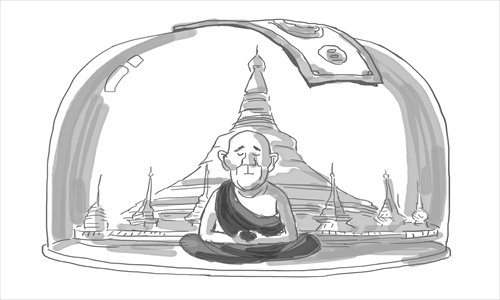Religion and money sit together uneasily as Myanmar opens up

I have visited the Shwedagon Pagoda in Yangon of Myanmar twice, and the two visits left me with quite different feelings.
Located in the north of Yangon's downtown area, the Shwedagon Pagoda is the symbol of Buddhism in Myanmar.
My first visit took place on a rainy day. The chimes coming from the pagodas' bells purified my soul, and the worshippers kneeling on the wet ground in front of the solemn Shwedagon Pagoda in the heavy rain calmed and moved me. However, this holy impression didn't linger in my mind long.
I paid my second visit with two friends a few months later. Tourists seemed to outnumber local worshippers. The country's splendid Buddhist culture, architecture and natural landscape are attracting growing interest, especially from Westerners, thanks to the government's desire to open up the country.
Visitors, accompanied by guides or local monks in red robes, could be seen in every corner of the site.
Although I was no longer a first-time visitor, I could hardly explain the complicated history of the pagoda, Buddhist tradition or culture the same way a professional guide could. While my friends were looking at a statue of Buddha in confusion and curiosity, a monk kindly offered to help.
He started a conversation on how to pray to the Buddha based on local tradition. He showed us every Buddha statue in the site, prayed for blessings for us and explained Buddhist doctrines to us while we listened earnestly.
We were so grateful to him that we offered 5,000 kyats ($5.83) before leaving. He shook his head, saying, "No, 10,000 kyats, this is the rule." We paid him as he demanded but left a little sour, and the amiable, selfless, and sacred image of Buddhism collapsed.
In fact, our case was not an isolated one. Similar experiences of some visitors to Buddhist countries such as Thailand and Singapore have been posted online on various travel forums.
Many visitors are caught in a dilemma when monks or nuns persuade them to buy amulets or donate to burn candles and incense for blessings, since they are mere sightseers rather than religious followers. Perhaps showing visitors around and then asking for a payment is more annoying. The sense of being cheated is real.
Outsiders often view religion from two extremes, either idealizing or demonizing it. My initial impression of the Shwedagon Pagoda sharply contrasts with my second visit. Outsiders often assume monks are benign sadhu. But taking a closer look at Myanmar's Buddhism after this unpleasant encounter, I find a different picture.
A Myanmese man becomes a monk at least once during his life, and there is no limit to the frequency or time he can do this. Even if he is married, he can choose to be a monk for a while to temporarily resume a single life.
Some argue that religion should be pure and the spiritual home of people of faith. But the fact is that although doctrines of many religions teach people that wealth is not permanent and cannot guarantee happiness, the link between religion and money is subtle.
Some of the wealthiest organizations in the world are connected to religion. China's Shaolin Temple has seen a surge in development under a controversial commercialization drive.
The relationship between religion and money is hotly debated by religious and cultural scholars. For non-religious visitors like me, perhaps the best way is to see it as a trivial thing and just be a simple sightseer.
A Chinese working in Myanmar for over 10 years told me he had never heard stories like my encounter before. I'm not sure if the monk I met is representative. But I've seen so many religious places tainted with commercialization and struggle with the dilemma of protecting religion while developing local tourism.
Cherishing the initial sacred image the Myanmar pagoda left me with, I hope Myanmar can maintain its original religious flavor during the process of developing its tourism industry.
The author is a reporter with the Global Times. yujincui@globaltimes.com.cn